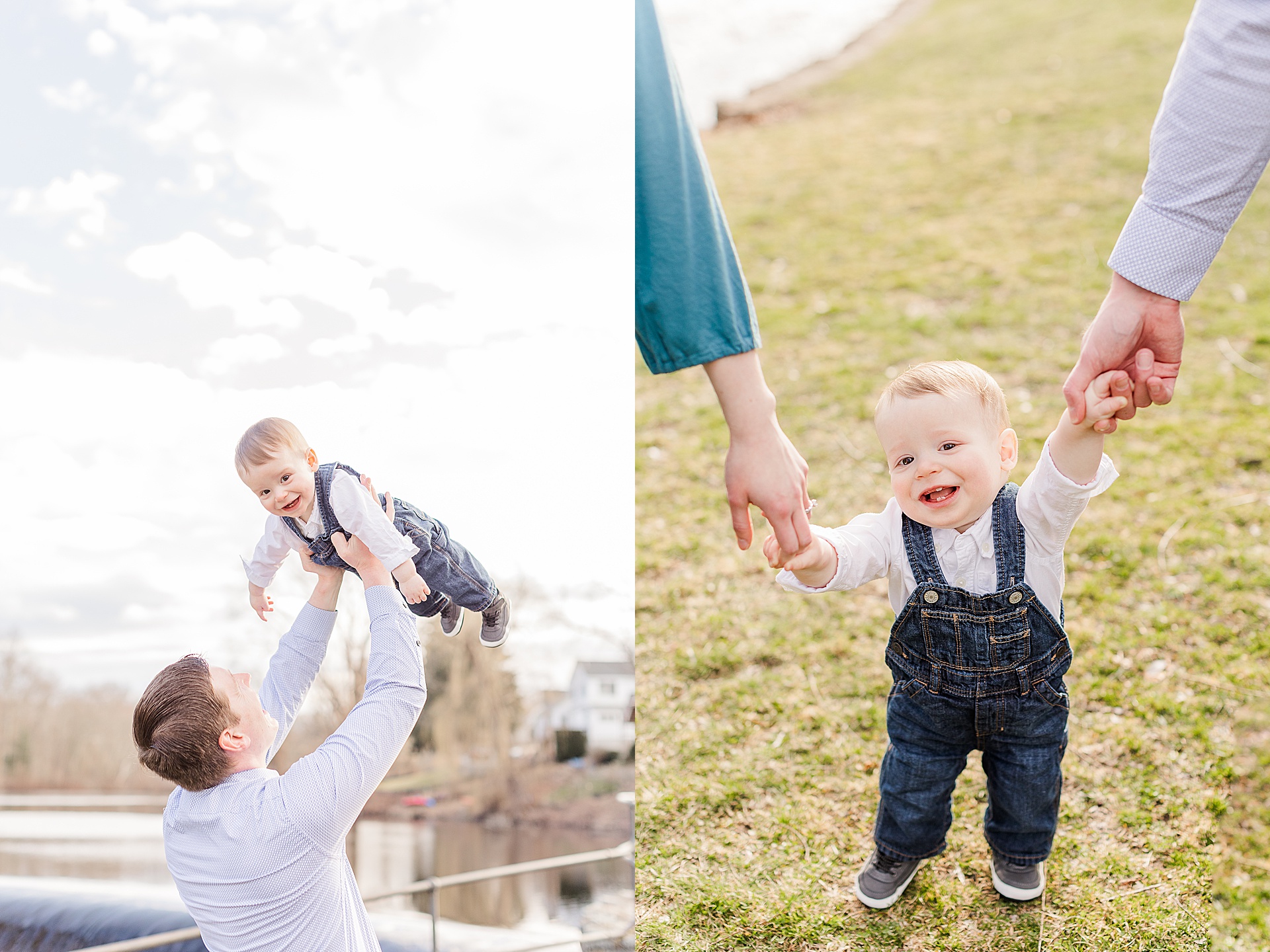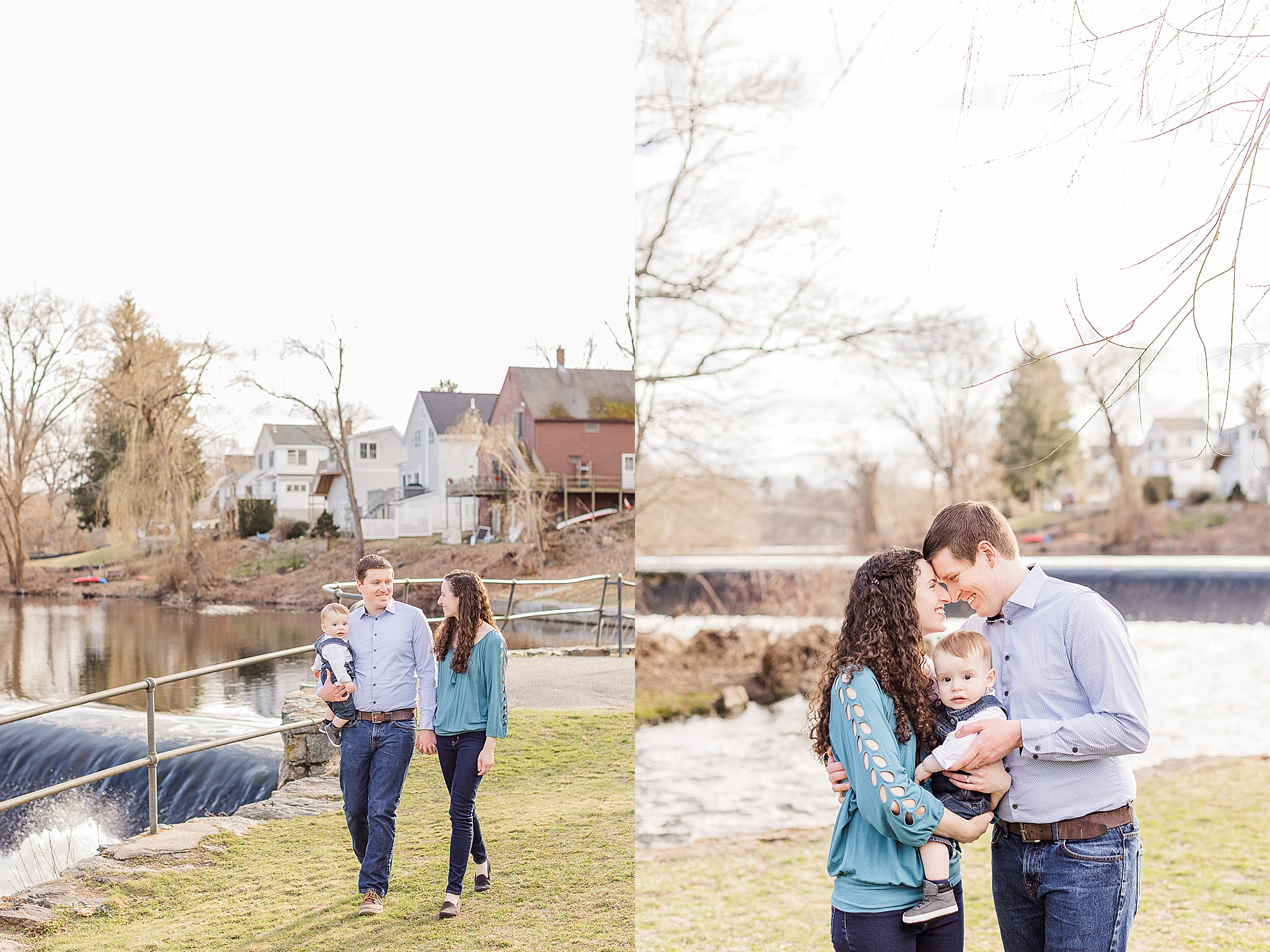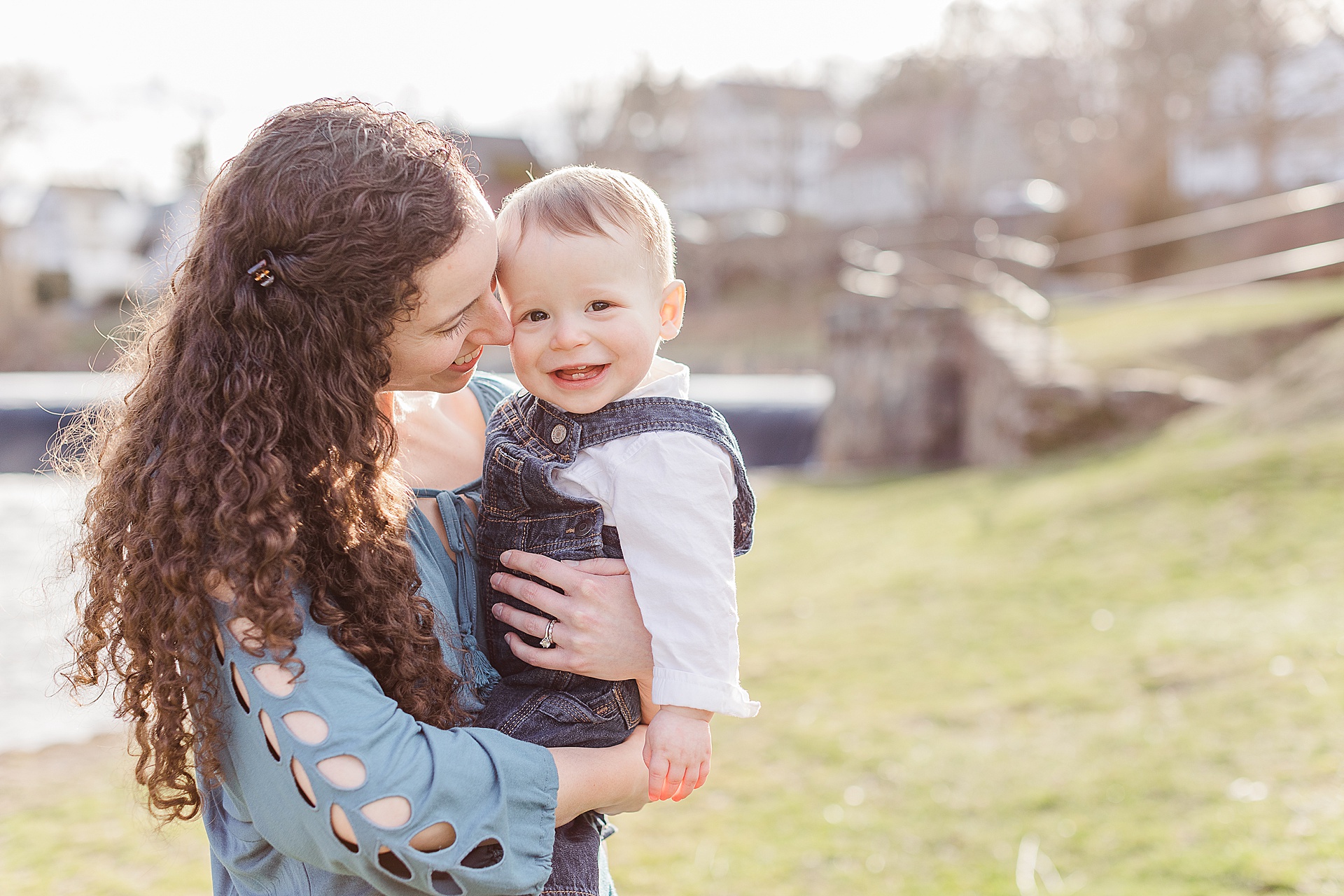Written by Rachel Ritchie and Rob Ritchie (in italics)
Our NICU Story
I went into labor at 39 weeks after a healthy and uneventful pregnancy. After laboring at home for three sleepless days and nights, including one “false start” visit to the hospital at 2am, my doctor finally admitted me to the hospital for elevated blood pressure. Because of COVID policies, my husband Rob had to wait downstairs while I was checked into triage. Thankfully the OB on call pushed me through to L&D right away, partially in hopes that being with Rob would lower my blood pressure. I got the epidural and managed to get in a few hours of much-needed sleep.
When the doctor broke my water to help my labor progress, she noticed that the baby had passed meconium. She mentioned that this meant the NICU team would be there for the delivery “just in case,” but she made it seem like nothing to worry about. A second epidural, four hours of pushing and not enough progress later, the doctor recommended a vacuum-assisted delivery in the operating room with a C-section as the last option. She read us a long list of everything that could possibly go wrong, and then hurriedly asked us to sign a form. Already exhausted and terrified as first-time parents with things not going as we’d hoped, we nervously held our breaths as I was wheeled to the OR. The lights were incredibly bright, the room buzzed with doctors, nurses, anesthesiologists, residents, and a full NICU team, the most people we had been in a room with in over a year since the pandemic began, and I felt so sore and tired.
The vacuum was unsuccessful, and after three attempts the doctor said that the baby’s heart rate was starting to drop so we needed to do the C-section right then. I remember being strapped down and given more anesthesia, and I remember a strong tugging sensation on my abdomen. All I could see was a blue tarp and Rob’s face by my shoulder. Then I heard, “Congratulations!” “You have a baby!” “It’s a boy! What’s his name?” but I didn’t hear a cry, and I didn’t see a baby. I saw a look of concern on Rob’s face and the next few minutes were a blur. I remember feeling so tired and foggy, shaking uncontrollably, and imagining the worst. Finally, the nurse pulled Rob over to the NICU team in the corner of the room, and then a few minutes later, she brought Bobby over so I could see him. I only really saw a blur wrapped in a blanket before he was whisked off to the NICU.
If we had any degree of a “birth plan,” what occurred was absolutely not to plan. In his earliest hours, Bobby endured more than any parent would want to see. He wasn’t breathing when he was born into an operating room filled with a couple dozen nurses and doctors. I saw him lifted up from Rachel, not moving, and watched the speed with which the doctor cut the cord to hand him off to the specialists that were waiting to step in. The “Congratulations!” we heard felt empty. The minutes that followed were agonizing. We could not see what was happening and could only look into each other’s eyes in fear and with hope. After what seemed like an eternity but was likely closer to ten minutes, a doctor came over to share that it had taken five minutes of assistance but that he was now breathing on his own. However, the doctors were concerned that the trauma of the labor experience on Bobby could have resulted in cognitive damage and wanted to admit him to the NICU for further testing. I followed Bobby up to the NICU, a plan Rachel and I had discussed and agreed upon weeks prior in case something like this were to happen. Of course, we never expected to be in that position.
Meanwhile, I was laying on the operating table, shaking, parched, and so tired that I couldn’t see straight. I heard more concern in the doctors’ voices. Something about a lot of blood, and then they were hooking up more needles and wires. I laid there imagining every worst-case scenario, both for me and for Bobby. After what felt like hours, I was wheeled back to the delivery room. The nurse explained that I had a fever and needed to be more stable before I could go see my baby. She didn’t know any details about what was going on in the NICU upstairs, but she tried to reassure me that Bobby was in good hands.
As I sat by Bobby’s bassinet in the NICU, I watched nurses and doctors attach wires to him and discuss tests to be run and specialists to be called. Once the commotion had subsided slightly, a nurse let me get closer to him. As I approached the bassinet and reached out my hand, Bobby grabbed onto my finger tightly. He didn’t let go for at least five minutes. Though the outcome was uncertain at that time, my love for him was clear and strong. These were the scariest and most emotionally draining hours of my life. I’ve never felt more alone than that time in the NICU. Cut off from the world due to COVID with the weight of new responsibility for the well-being of an infant solely on my shoulders, unable to be with my wife when she also needed me most.
When Rob returned from the NICU, he shared that Bobby was doing great. He explained that the doctors were concerned that Bobby might have suffered brain damage from the stress of delivery and the lack of oxygen to his brain when he was first born, but that so far all the tests pointed to him being healthy. He showed me some pictures so I could see him. It was hard to imagine that this living, breathing human came from me, and I felt so empty that Bobby and I had been together for so many months and now were separated at a time that I couldn’t have imagined we would be. Rob spent the next few hours going back and forth from the maternity ward to the NICU, feeling torn between supporting his wife and his new son.
I was surprised to learn that Rachel had remained in the operating room for so long. No one gave me an update on the condition of my wife or let me know that there were complications. The lack of communication between the NICU and the maternity ward made a difficult situation even more challenging. Once I was up to speed on Rachel’s status and understood what was being done to help her, I made sure to go and check in on Bobby and to be there when doctors arrived to do tests. It was the only way to be sure we actually knew what was going on.
Late that night, my fever broke, and I was cleared to move to the postpartum floor. The nurses brought us first to the NICU so I could see Bobby. He was laying on a raised table, hooked up to monitors and wires, with machines beeping all around. From my reclined position on the hospital bed and over my mask I could only see his feet and the tip of his nose, and I could reach out and barely touch his tiny hand. I had trouble believing that this was my baby, and I couldn’t understand how I’d possibly be able to care for him in the state I was in. I felt both gratitude and envy for the NICU nurse, a complete stranger, who was taking care of my newborn son when I couldn’t. The NICU team wanted to keep Bobby a little bit longer to monitor him and said that he’d likely join us in our recovery room in the early morning.
That night is fuzzy in my memory. I remember lots of nurse checks, trying to figure out the hospital-grade pump, and some fitful sleep. I also remember our room being incredibly hot, so much so that an engineer was sent the next day to fix the heating system that was stuck in overdrive. Emotionally I felt spent and somewhat numb, unable to process how the previous 24 hours had gone.
The morning came, and Bobby had yet to arrive in our room. I managed to get up out of bed and take a few assisted steps. Our phone rang, and it was the NICU nurse. She explained that Bobby was doing fine, but that he was going to stay in the NICU a bit longer. Our hearts sank. With my nurse’s blessing, Rob wheeled me up to the NICU. Bobby was sleeping peacefully, now hooked up to even more tubes and wires. The doctors came to do rounds and explained that all of the stress on Bobby’s body from his birth had resolved, and the bloodwork and brain testing all came out fine. We were relieved to hear this news. However, Bobby’s oxygen levels had dropped overnight and he had some fluid in his lungs. They explained this was normal for C-section babies and that time would help it resolve. They couldn’t say how long he would need to stay, but he would have to be able to maintain his oxygen levels on his own for at least 12 hours before he would leave the NICU. When they moved on to their next patient, Bobby woke up. The nurse guided Rob through a temperature check and a diaper change, and then she offered to help me to a chair so I could finally hold my son for the first time.
I don’t remember exactly how I felt in that moment, but looking back at pictures of Bobby in my arms, breathing tube taped to his nose, wires coming out of both ends of his hospital blanket, IV tubes in my arms, and a mask covering most of my face, this was not at all how I imagined holding my new baby would be.
Over the next few days, Bobby fought hard to breathe on his own. Our days were filled with feedings and lactation consultants, doctors’ rounds, nurse checks for me, hospital meals, pumping, and calls with family. Sleep was fleeting and interrupted. Traveling back and forth from the postpartum floor to the NICU was both physically taxing and mentally exhausting, especially considering I could still barely walk. We struggled with the lack of communication between the NICU and the postpartum floor and the feeling of needing to be in two places at once. Feedings were a challenge since my milk hadn’t come in yet and Bobby was getting used to being bottle-fed formula. And through it all, we were continually reminded of what we were missing – hearing other babies in the rooms around us, staring at the posters of happy mothers and babies on the walls, getting questions we couldn’t answer from friends and family.
What perhaps turned out to be a blessing in disguise was that my blood pressure continued to stay elevated, so we were told we’d be in the hospital for a couple more days than expected. We hoped and prayed that we wouldn’t have to leave before Bobby did so that we could all stay together in the hospital. Finally on day 4, the NICU team shared that Bobby passed his test – he didn’t need any supplemental oxygen overnight. His lungs were keeping up and he was cleared to move in with us in our room! He was wheeled in a little while later wearing a hat decorated with gift ribbon. It was such a ridiculous and wonderful moment. We were that much closer to going home, and we could finally cuddle and care for Bobby how we wanted, without all the wires and tubes and monitors. We marveled at his resilience and couldn’t wait to get to know him better.
The evening of day 5, after final nurse and doctor checks for both me and Bobby, we left the hospital to come home and begin our lives together as a family.
Thankfully, though he had a scary start, all signs were that Bobby had recovered and was focused fully on being a normal growing newborn. We returned home to introduce him to all four of his grandparents, who had spent the last few days hanging on every text and call and treasuring every picture. Our dog Luna was also waiting, not knowing the storm that was coming for her!

What we wish we had known prior to our NICU experience
I wish that I had known that the NICU experience wouldn’t mean that I couldn’t bond with my baby. The birth I had imagined – in the delivery room, hearing him cry, having him placed on my chest, breastfeeding right away, having him measured and weighed at the station in the corner of the room, seeing him wrapped up in the hospital blanket and hat that we noticed when we arrived – didn’t come to be. I didn’t hold my baby until he was a day old, and even then, he felt like a stranger. I had missed his whole life so far. I worried that I didn’t know how to care for him, or how to comfort him, without that initial skin-to-skin and feeding time that every hospital poster and Instagram account touted as crucial in the first hours of life. I wish that I had known that bonding could take time. That over the hours and days spent with him in the NICU, we would begin to get to know each other. That almost a year later, the NICU experience would feel like just a blink in time compared to the days and months spent together at home.

Advice for parents experiencing the NICU
Lean on the nurses so that you can get some rest. While it was heart wrenching being separated from our new baby, knowing that he was in caring, capable hands in the NICU meant that we could get some more rest at night. I was in rough shape myself, and I didn’t realize at the time how important to my recovery the extra hours of sleep would be. Once Bobby joined us in our room the last night we were in the hospital, we realized that sleep would be elusive for the foreseeable future.
I also highly recommend speaking with the NICU social worker. I only knew that there was such a person because a friend let me know – no one in the hospital offered it. However, when my husband and I spoke with the social worker, we felt like we had taken the first step in beginning to heal from our traumatic birth experience. She helped us to feel validated and heard, and she helped me advocate for some skin-to-skin time with Bobby even while he was still in the NICU. She also offered some helpful online resources for NICU parents.
One last thing is to check out the Dear NICU Mama podcast. I only recently came across it almost a year later, but I have found it incredibly therapeutic in continuing to process our NICU experience.

See more NICU experience stories here
BE THE FIRST TO COMMENT